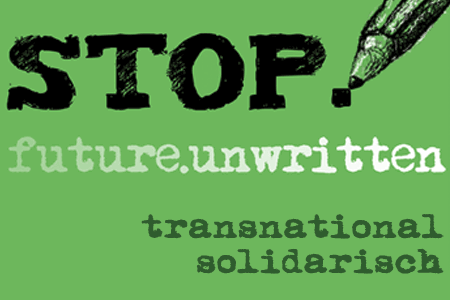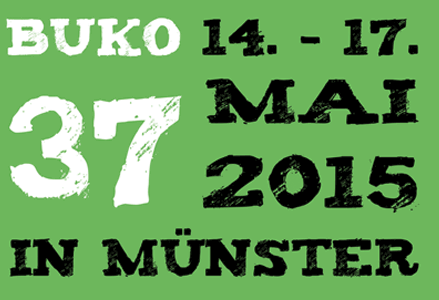Bildung im Neoliberalismus. Analysen und Emanzipatorische Gegenperspektiven
Emanzipatorische Politik lässt sich nicht auf einen räumlichen und sozialen Nahbereich beschränken. Eine transnationale Vernetzung ist wichtig, um eine vollständigere Analyse zu ermöglichen und um emanzipatorische Alternativen kollektiv zu entwickeln und umzusetzen. Aus dieser Grundhaltung heraus wollen wir versuchen das Thema Bildung aus einer globalen Perspektive zu betrachten und Kämpfe um ein Recht auf Bildung, zusammen zu denken. Bildung ist für uns dabei ein individueller, selbstbestimmter Prozess, der nicht zwangsläufig mit formaler bzw. institutionalisierter Bildung übereinstimmt, der aber kollektiv organisiert sein kann. Inhaltlich kann emanzipatorische Bildung keineswegs räumlich begrenzt sein, was angesichts der beschränkten lokalen Perspektive eine Herausforderung darstellt. An dieser Stelle kommt die Frage auf, wie kollektive Lernprozesse in einem transnationalen Rahmen organisiert werden können und wie ein Austausch stattfinden kann.
Bildung befreien?!
Wenn wir ein Recht auf Bildung einfordern, geht es uns dabei nicht (nur) darum, einen gleichberechtigten Zugang zu formalen Bildungssystemen zu fordern. Es geht uns insbesondere auch darum, eine breite Debatte über die Frage anzustoßen, was und wie Bildung überhaupt sein soll. In den letzten Studierendenprotesten in Deutschland und Österreich wurde immer wieder freie Bildung gefordert. Wir verstehen unter dieser Forderung mehr als einen weitgehend kostenfreien Zugang zum sogenannten Bildungssystem. freie Bildung ist für uns ein Gegenbegriff zu "Bildung für den Kapitalismus" (oder kapitalistischer Bildung), die den Zwängen des Systems unterworfen bleibt, Humankapital für den Arbeitsmarkt generieren soll und Herrschaftsverhältnisse reproduziert statt diese zu hinterfragen. Der Kampf um freie Bildung richtet sich zum einen gegen den Ausschluss von Personen durch Selektionsmechanismen, durch sichtbare wie unsichtbare Hürden. Gleichzeitig geht es um die Frage, wo innerhalb dieses Systems Freiräume geschaffen werden können, die emanzipatorische Bildungsprozesse ermöglichen. Um Antworten auf solche Fragen zu finden, wollen wir voneinander und miteinander lernen.
Wie sehen Kämpfe um so etwas wie freie Bildung an verschiedenen Orten der Welt aus und welche Verbindungen lassen sich zwischen unterschiedlichen lokalen Auseinandersetzungen finden? Was können wir beispielsweise von der Kritik der Studierendenbewegung in Chile an einem hochgradig privatisierten Bildungssektor lernen oder wie gestaltet das Movimento Sem Terra in Brasilien Alternativen zum staatlichen Bildungssystem?
Gleichzeitig haben wir es mit politischen Bildungsprogrammen und Diskursen über Bildung von weltumspannender Reichweite zu tun. Während sich internationale Bildungsprogramme darauf konzentrieren mehr Bildung in die Welt zu bringen, ist für uns ein kritisches Hinterfragen der Praktiken und der damit verbundenen Interessen, Ziele und Machtstrukturen zentral. Die Vorstellung Bildung könne messbar und deren Wirkung evaluierbar gemacht werden, scheint uns eine weitere Ausprägung einer Gesellschaft in der alle Lebensbereiche kontrolliert und quantifiziert werden.
Unsere Perspektive auf Bildung ist eine von Vielen. Es kann und sollen hier keine allgemeingültige Antworten gefunden werden. Wir wollen uns vielmehr kritisch mit Bildung im und zum Neoliberalismus auseinandersetzen und auch Formen, die über das formale Bildungssystem hinausgehen mitdenken. Dazu laden wir euch herzlich ein mit uns gemeinsam auf dem nächsten BUKO in Münster zu diskutieren.
Education in neoliberalism. Analysis and emancipatory alternative perspectives
Emancipatory politic cannot be restricted to a spatial and social vicinity. Transnational networking is important to facilitate a complete analysis and to develop and implement emancipatory alternatives as a collective. Building on this basic attitude, we want to try to set the topic education into a global perspective and to combine fights for the right to education. For us, education is an individual, self-determined process that does not necessarily coincide with formal institutionalized education, but a process that can be collectively organized. Emancipatory education cannot be spatially limited in terms of content ? a fact that signifies a challenge considering the limited local perspectives. Now the question arises, how collective learning processes can be organized in a transnational frame and how there can be any communication or exchange of ideas.
Free education?
When we demand a right to education, it is not (solely) about equal access to formal educational systems. It is particularly about the initiation of a debate on what education actually should be like. The last students protests in Germany and Austria all demanded free education. We understand this demand as more than just free access to the so called educational system. For us, free education is an antithesis to "Education for capitalism" (or capitalistic education), which is still subject to the constraints of the system, which is supposed to generate human capital for the job market and which reproduces power relations instead of questioning them. The fight for free education is directed against the exclusion of people through selection mechanisms, through visible and invisible obstacles. At the same time, it is about the question where we can create free spaces within the system that can enable emancipatory educational processes. In order to find answers for these questions, we want to learn from and with one another. How do fights about something like free education look like at different places of the world and which connections can be drawn between the different local controversies? What can we learn from the critique of the students? movement in Chile concerning a highly privatized education sector or how does the Movimento Sem Terra in Brazil organize alternatives to the stately educational system?
At the same time, we have to deal with political educational programmes and discourses on education with global range. While international education programmes concentrate on bringing more education to the world, we think that a critical questioning of the practices and the connected interests, goals and power relations is of crucial importance. The notion that education could be measurable and its impact evaluable, seems to be another characteristic of a society in which all spheres of life a controlled and quantified. Our perspective on education is one of many. It is not the aim to find universal answers. We rather want to critically deal with education in neoliberalism and also think about ways that go beyond the formal educational system. We therefore like to invite you to discuss with us at the next BUKO in Münster.






